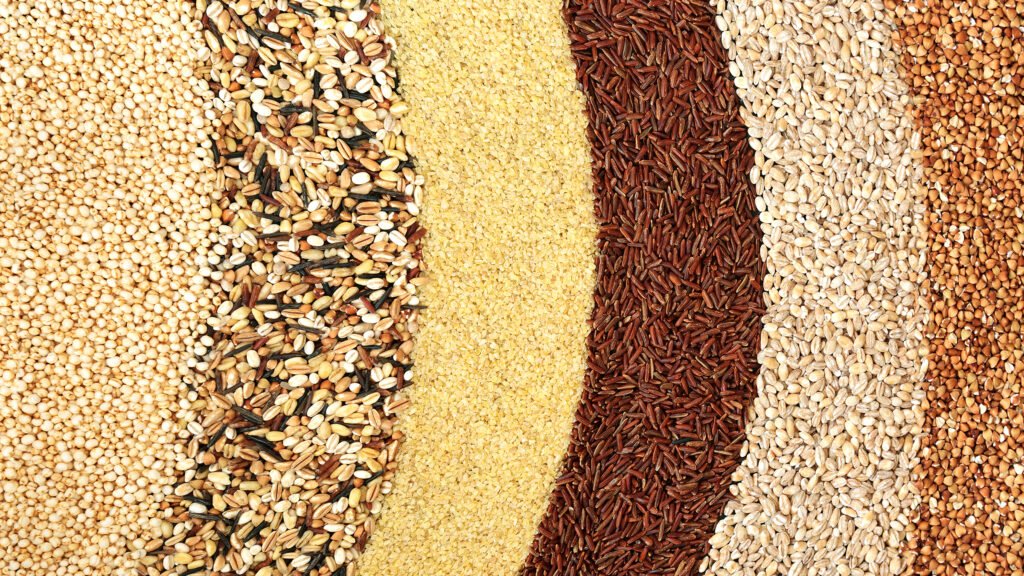Benefits of Whole Grains for Incorporating Them into Meals, Unlike their refined counterparts, which only contain the endosperm of the grain kernel, whole grains retain all three components: bran, germ, and endosperm.

Credit: GoodRx
This preservation of the entire grain structure means that consuming whole grains provides ample amounts of fiber as well as vital vitamins and minerals to promote optimal health.
Therefore in this blog post we aim to explore these various advantages while also offering practical tips on how you can incorporate more wholesome meals into your everyday routine!
Whole Grains: Their Advantages and Benefits of Whole Grains for Incorporating Them into Meals
Abounding in nutrients
Essential nutrients are abundant in whole grains, consisting of:
Fiber aids in maintaining healthy blood sugar levels, supports digestive health and assists with weight management.
Vitamins, especially the B-complex vitamins like niacin, thiamine and folate are important for both brain function and energy production.
Minerals such as iron, magnesium, and selenium play crucial roles in a range of bodily activities like promoting bone health and immune support, as well as facilitating oxygen transportation.
Antioxidants are beneficial in shielding cells from harm caused by free radicals.
Digestive Health is the second topic.
By increasing the bulk of stool and promoting regular bowel movements, whole grains with high fiber content aid in maintaining healthy digestion. This plays a vital role in preventing constipation and lowering the possibility of diverticular disease.
Health of the Heart
The consumption of whole grains is reputed to promote heart health, with research indicating that ongoing intake can diminish cholesterol levels, blood pressure and inflammation – all risk factors for heart disease.
Management of weight
Whole grains’ fiber content assists in prolonging the sensation of fullness, decreasing the probability of consuming excess amounts. This attribute may be advantageous for weight control and sustaining a healthy body mass throughout time.
Controlling Blood Sugar Level
When compared to refined grains, whole grains possess a lower glycemic index which leads to a gradual and slower increase in blood sugar levels. This property can contribute to the regulation of blood sugar levels as well as minimizing the probability of developing type 2 diabetes.
Lowered Probability of Developing Chronic Health Conditions
Eating whole grains on a regular basis has been associated with decreased chances of developing multiple chronic ailments such as type 2 diabetes, stroke, and specific cancers like colorectal cancer.
Here are some suggestions for adding whole grains to your dishes.
It’s easy to enjoy the benefits of whole grains with these practical tips that make incorporating them into your diet both simple and delicious.
Begin your day by consuming whole grains.
Incorporating whole grains into your diet is an ideal way to start the day during breakfast.
For a healthy breakfast, opt for steel-cut or rolled oats over instant blends. Enhance with fresh fruit, nuts and some honey drizzle on top to set your day up right.
To make a healthier choice, select whole grain cereals and steer clear of those with added sugars.
To increase protein and healthy fats, try switching to whole wheat or multigrain bread when making toast. Enhance it with nutritious toppings like avocado, nut butter or a poached egg.
Opt for Whole Grain Substitutes
When you go shopping, search for whole grain substitutes to replace common refined grain items.
Replace regular pasta with whole wheat or any other type of whole grain alternative for your meals.
Opt for brown rice in lieu of white and experiment with alternative whole grains such as quinoa, barley or farro to mix things up.
When it comes to bread and tortillas, choose those made with whole grains rather than their white counterparts.
Try out different types of whole grains in your diet.
Diversify your culinary skills by experimenting with a variety of wholesome grains.
Quinoa is a multipurpose grain that can effortlessly integrate into salads, soups or serve as an accompaniment. It’s also rich in protein with all nine vital amino acids represented within it.
Farro is an ancient grain renowned for its chewy texture and makes the perfect addition to salads or a solid base for bowls.
Barley is an excellent addition to soups and stews, providing a flavorful nuttiness and robust texture.
Include whole grains as a component in your main dishes.
Incorporating whole grains into your main meals can be a tasty option.
Balanced meals can be created by blending cooked whole grains, veggies, proteins and healthy fats in a grain bowl. A quinoa mix that includes roasted vegetables, chickpeas along with tahini dressing could serve as an example.
Stuff bell peppers, tomatoes or zucchinis with whole grains such as quinoa and bulgur.
For a speedy and nourishing meal, blend vegetables, lean protein, and a delightful sauce with brown rice or other whole grains such as farro or barley to make Whole Grain Pilafs and Stir-Fries.
Baking using whole grains is recommended.
Replace refined flours with whole grain flours when baking.
For recipes like bread, muffins, pancakes, and cookies it’s a good idea to substitute all-purpose flour with whole wheat flour. You can either replace some or all of the quantity according to your preference.
You can blend oats into a fine powder, known as oat flour, and use it as a substitute for regular flour in baking.
The final result or decision drawn from an analysis, evaluation, or investigation is referred to as a
conclusion
Benefits of Whole Grains for Incorporating Them into Meals, Adding whole grains to your diet is a straightforward yet potent method of enhancing nutritional intake and promoting overall well-being.
Whole grains offer multitudes of advantages, including better digestion, heart health, weight management, as well as blood sugar regulation—thereby making them an essential part of any nutritious meal plan.
By implementing minor modifications like incorporating whole-grain foods into breakfast or trying various kinds of whole grain options in place of refined ones through experimentation with new flavors— one can relish appetizing dishes that satiate the body’s hunger while contributing towards long-term fitness goals ultimately leading you closer to maintaining optimal physical condition.
Embrace wholesome nutrition by leveraging the power held within every kernel; add whole grain sustenance today for more significant strides towards achieving a balanced lifestyle!










